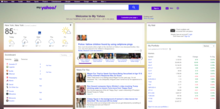
RSS is a web feed that allows users and applications to access updates to websites in a standardized, computer-readable format. Subscribing to RSS feeds can allow a user to keep track of many different websites in a single news aggregator, which constantly monitor sites for new content, removing the need for the user to manually check them. News aggregators can be built into a browser, installed on a desktop computer, or installed on a mobile device.

Mail is an email client included by Apple Inc. with its operating systems macOS, iOS, iPadOS, watchOS, and visionOS. Mail grew out of NeXTMail, which was originally developed by NeXT as part of its NeXTSTEP operating system, after Apple's acquisition of NeXT in 1997.

NetNewsWire is a free and open-source news aggregator for macOS and iOS. It was introduced by Brent and Sheila Simmons on July 12, 2002, under their company Ranchero Software.
Yahoo! News is a news website that originated as an internet-based news aggregator by Yahoo!. The site was created by Yahoo! software engineer Brad Clawsie in August 1996. Articles originally came from news services such as the Associated Press, Reuters, Fox News, Al Jazeera, ABC News, USA Today, CNN and BBC News.
Personalization consists of tailoring a service or product to accommodate specific individuals. It is sometimes tied to groups or segments of individuals. Personalization involves collecting data on individuals, including web browsing history, web cookies, and location. Various organizations use personalization to improve customer satisfaction, digital sales conversion, marketing results, branding, and improved website metrics as well as for advertising. Personalization acts as a key element in social media and recommender systems. Personalization influences every sector of society — be it work, leisure, or citizenship.

In computing, a news aggregator, also termed a feed aggregator, content aggregator, feed reader, news reader, or simply an aggregator, is client software or a web application that aggregates digital content such as online newspapers, blogs, podcasts, and video blogs (vlogs) in one location for easy viewing. The updates distributed may include journal tables of contents, podcasts, videos, and news items.

Google Reader is a discontinued RSS/Atom feed aggregator operated by Google. It was created in early 2005 by Google engineer Chris Wetherell and launched on October 7, 2005, through Google Labs. Google Reader grew in popularity to support a number of programs which used it as a platform for serving news and information to users. Google shut down Google Reader on July 1, 2013, citing declining use.
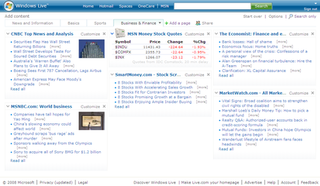
Windows Live Personalized Experience was a customizable portal launched by Microsoft in early November 2005. It was one of the first Windows Live services to launch.
Netvibes is a French company that offers web services.
HCL Connections is a Web 2.0 enterprise social software application developed originally by IBM and acquired by HCL Technologies in July 2019. Connections is an enterprise-collaboration platform which aims to helps teams work more efficiently. Connections is part of HCL collaboration suite which also includes Notes / Domino, Sametime, Portal and Connections.

iGoogle was a customizable Ajax-based start page or personal web portal launched by Google in May 2005. It was discontinued on November 1, 2013, because the company believed the need for it had eroded over time.
The multinational Internet corporation Yahoo! has received criticism for a variety of issues.
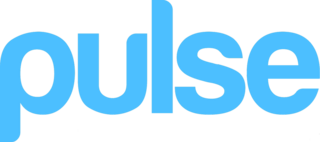
LinkedIn Pulse was a news aggregation app originally developed for Android, iOS and HTML5 browsers, originally released in 2010. The app, in its original incarnation, was deprecated in 2015 and integrated into LinkedIn.
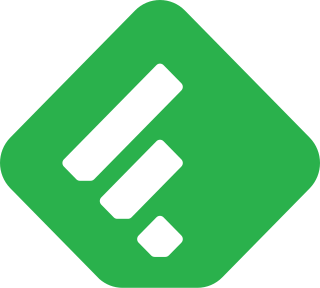
Feedly is a freemium news aggregator application for web browsers and mobile devices running iOS and Android. It is also available as a cloud-based service. It compiles news feeds from a variety of online sources for the user to customize and share with others. Feedly was first released by DevHD in 2008.

Guide was a US technology startup company developing a newsreader app that translates text from online news sources, blogs and social media streams into streaming audio and video. The company's apps include animal character readers. The company was founded in 2012 by chief executive officer Freddie A. Laker, and privately launched its mobile app in alpha in February 2013.
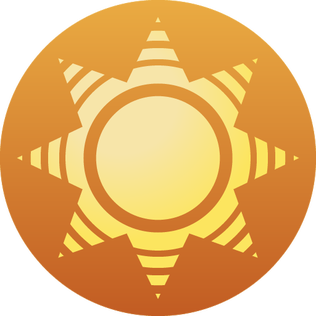
NewsBlur is an American software company based in New York City and San Francisco. It runs an online RSS news reader service accessible both online and via a free open-source mobile app for offline reading. Furthermore, the software powering NewsBlur is available and is published in an open-source application, licensed under the MIT License. Limited access to the service is free for up to 64 sites; unlimited access is available for an annual subscription fee.
The Old Reader is a web-based news aggregator that delivers website, blog, and other Internet content to a web-based inbox. The service sprang up when Google removed social features from Google Reader; the site supports social media sharing, including the ability to "like" content, and find friends via social media networks.
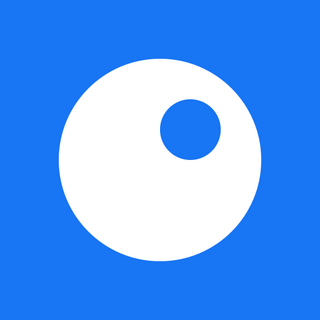
Inoreader is a web-based content and RSS feed reader, a cloud-based service for web browsers and mobile devices running iOS and Android. It compiles news feeds from online sources for the user in unified layout to customize and share with others. Inoreader was first released by Innologica in 2013.

QuiteRSS is a free and open source cross-platform news aggregator for RSS and Atom news feeds. QuiteRSS is released under the GPL-3.0-or-later license. It is available for Microsoft Windows, MacOS, Linux, and OS/2. QuiteRSS is also available as a portable application for Windows.

RSS Guard is a free and open-source news aggregator for web feeds and podcasts. It is written in C++ and uses Qt, which allows it to fit with the look and feel of different operating systems while remaining cross-platform. It includes a file downloader, advanced network proxy configuration, and supports external media viewing tools.

